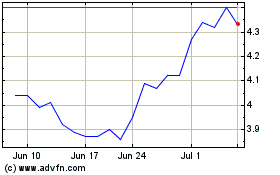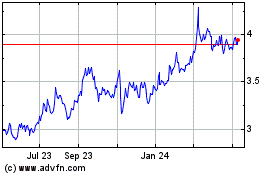Board members of struggling Japanese electronics maker Sharp
Corp. met Thursday and agreed to sell the company to Taiwan's
Foxconn Technology Group for almost $6 billion, a decision hailed
as a symbol of a push by Japan's government to open up the
country's notoriously insular industries.
There was one snag. Foxconn, which assembles most of Apple
Inc.'s iPhones, was having second thoughts. In a written statement
released hours later, Foxconn said it would delay signing any deal
because it had been surprised by new information Sharp had
disclosed just a day before, and needed more time to study the
details.
The surprise was a list of about 100 items of contingent
liabilities—or potential future financial risks at Sharp totaling
roughly ¥ 350 billion, or $3.1 billion—that Foxconn would assume if
it completed the takeover, people familiar with the matter said.
While Foxconn said it hoped to resolve the matter quickly and
complete the deal, the 11th-hour development was symbolic of
topsy-turvy negotiations in which the foreign suitor outmaneuvered
a Japanese government-backed fund to win over one of the country's
most venerated brands.
The deal was being watched closely not just because of its
implications for Japan's reputation for protecting its prized
industrial names from foreign ownership, but because it also marked
a passing of the technological generations: 103-year-old Sharp was
a pioneer of the modern television set in Japan and the pocket
calculator; Foxconn, founded over four decades ago, has grown into
a $120 billion behemoth thanks to its proficiency in manufacturing
smartphones.
Until last month, Foxconn, formally known as Hon Hai Precision
Industry Co., was reported by Japanese media to be the underdog
bidder that trailed an offer from Innovation Network Corp. of
Japan, a fund that has rescued several ailing Japanese technology
companies since it was formed in 2009.
Foxconn won over Sharp's board, in part by offering to pay a
significant premium and through the suasion of its billionaire
chairman, Terry Gou. The Taiwanese tycoon had gained the acceptance
of Sharp's bank backers and its board through personal visits to
lay out Foxconn's bid, which included protecting jobs and keeping
Sharp's technology in Japan.
But while Mr. Gou had publicly trumpeted signs of success during
negotiations, he was silent for hours after Sharp finally said he
had won the deal he had been chasing since last year, even as INCJ
and Japan's industry minister, Motoo Hayashi, made comments that
Sharp was now under Foxconn's control. After Foxconn finally
announced the delay, Sharp declined to comment further.
It was the latest twist in a tortured history between Mr. Gou
and Sharp dating to 2012, when Foxconn reached a tentative deal to
invest in Sharp but later pulled out because Sharp's share price
had fallen during the negotiations to make the deal final.
That history made some Sharp executives hesitant about another
deal with Foxconn when Sharp's losses began piling up last year and
it started looking for a bailout, people familiar with the matter
have said. INCJ, the government-backed fund, was seen as a more
trustworthy rescuer.
The tide turned around the time Mr. Gou addressed the Sharp
board on Jan. 30 and gave a commitment to keep Sharp intact, in
contrast to INCJ's plan to split up the company. On Feb. 4, Sharp's
chief executive, Kozo Takahashi, said his company was giving more
attention to the Foxconn bid, and Mr. Gou flew to Sharp's
headquarters in Osaka, Japan, the next day in a bid to wrap
everything up.
But an all-day meeting between Messrs. Gou and Takahashi ended
inconclusively, with Mr. Gou saying the two sides were 90% of the
way toward a deal while Sharp said it was still weighing both the
Foxconn and INCJ bids.
The two sides' uneasy relationship was spotlighted by a
disagreement over whether Sharp had agreed to make Foxconn its
preferred negotiating partner. Mr. Gou, waving a piece of paper,
said it had. Shortly afterward, Sharp filed a formal statement with
the Tokyo Stock Exchange saying that was false.
Three weeks later, Sharp finally made up its mind on Thursday,
only to learn that Mr. Gou—until that point a hard-charging leader
bent on completing a deal as soon as possible—hadn't made up
his.
Foxconn didn't detail the new information it said it had been
handed Wednesday, but said it would take time to consider. "We will
have to postpone any signing of a definitive agreement until we
have arrived at a satisfactory understanding and resolution of the
situation," Foxconn said.
Under the deal outlined by Sharp, it would issue new shares to
Foxconn in exchange for an infusion of ¥ 489 billion. Sharp said
Foxconn would purchase preferred shares held by two creditors—the
core banking units of Mizuho Financial Group Inc. and Mitsubishi
UFJ Financial Group Inc.—for ¥ 100 billion.
Other payments that people familiar with the matter said would
total about ¥ 70 billion would bring the total commitment by
Foxconn to ¥ 659 billion, or $5.9 billion.
Foxconn's offer was double what INCJ was offering and included
relief for Sharp's two main banks, which are saddled with the
company's debt.
Shares in Sharp fell 14% to ¥ 149 on Thursday, while Hon Hai
shares rose 2.6%. The deal would let Foxconn buy new Sharp shares
for ¥ 118 and control nearly two-thirds of the company, diluting
existing shareholders. Foxconn's move to postpone the deal came
after markets closed for both stocks.
Contingent liabilities can often pose a hurdle in merger talks.
They represent costs a company might or might not face based on the
outcome of lawsuits, contracts or other factors. Sharp's 2015
annual report lists contingent liabilities relating to its solar
business, which signed on for long-term supplies of electricity and
raw materials that it ultimately didn't need.
In one electricity-supply arrangement, Sharp said it had agreed
to make payments of at least ¥ 43.9 billion, and it said potential
losses were difficult to estimate.
If Foxconn can join forces with Sharp, it would be in a better
position to develop advanced screens for Apple's iPhones, which
Foxconn already assembles. An iPhone's most expensive component is
its touch-screen display, making up more than 20% of manufacturing
costs, which is why Mr. Gou is eager to supply them, analysts
say.
Still, Foxconn faces skepticism about how it would reverse
Sharp's heavy losses if it takes over, given Mr. Gou's pledge not
to split up the company or make major layoffs.
Atsuko Fukase in Tokyo contributed to this article.
Write to Eva Dou at eva.dou@wsj.com, Wayne Ma at
wayne.ma@wsj.com and Takashi Mochizuki at
takashi.mochizuki@wsj.com
(END) Dow Jones Newswires
February 25, 2016 14:15 ET (19:15 GMT)
Copyright (c) 2016 Dow Jones & Company, Inc.
Mizuho Financial (NYSE:MFG)
Historical Stock Chart
From Mar 2024 to Apr 2024

Mizuho Financial (NYSE:MFG)
Historical Stock Chart
From Apr 2023 to Apr 2024
